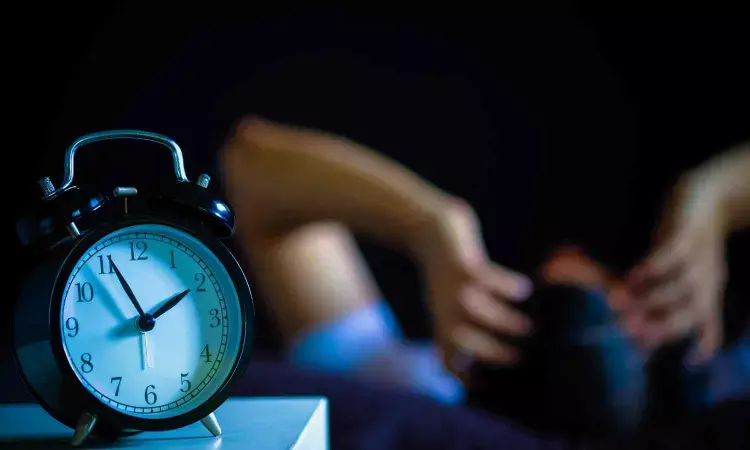- Home
- Medical news & Guidelines
- Anesthesiology
- Cardiology and CTVS
- Critical Care
- Dentistry
- Dermatology
- Diabetes and Endocrinology
- ENT
- Gastroenterology
- Medicine
- Nephrology
- Neurology
- Obstretics-Gynaecology
- Oncology
- Ophthalmology
- Orthopaedics
- Pediatrics-Neonatology
- Psychiatry
- Pulmonology
- Radiology
- Surgery
- Urology
- Laboratory Medicine
- Diet
- Nursing
- Paramedical
- Physiotherapy
- Health news
- Fact Check
- Bone Health Fact Check
- Brain Health Fact Check
- Cancer Related Fact Check
- Child Care Fact Check
- Dental and oral health fact check
- Diabetes and metabolic health fact check
- Diet and Nutrition Fact Check
- Eye and ENT Care Fact Check
- Fitness fact check
- Gut health fact check
- Heart health fact check
- Kidney health fact check
- Medical education fact check
- Men's health fact check
- Respiratory fact check
- Skin and hair care fact check
- Vaccine and Immunization fact check
- Women's health fact check
- AYUSH
- State News
- Andaman and Nicobar Islands
- Andhra Pradesh
- Arunachal Pradesh
- Assam
- Bihar
- Chandigarh
- Chattisgarh
- Dadra and Nagar Haveli
- Daman and Diu
- Delhi
- Goa
- Gujarat
- Haryana
- Himachal Pradesh
- Jammu & Kashmir
- Jharkhand
- Karnataka
- Kerala
- Ladakh
- Lakshadweep
- Madhya Pradesh
- Maharashtra
- Manipur
- Meghalaya
- Mizoram
- Nagaland
- Odisha
- Puducherry
- Punjab
- Rajasthan
- Sikkim
- Tamil Nadu
- Telangana
- Tripura
- Uttar Pradesh
- Uttrakhand
- West Bengal
- Medical Education
- Industry
Sleep disorders independent predictors of taste dysfunction, suggests study

Sleep disorders are independent predictors of taste dysfunction, suggests study published in the BMC Oral Health.
This study aimed to investigate the association between sleep disorders and the prevalence of taste dysfunction and the mediation effect of oral microbe in adults over 40 years. Cross-sectional data were utilized from the National Health and Nutrition Examination Survey (2011–2014).
Regression models were employed, adjusting for demographic variables and covariates. Subgroup analyses were conducted based on age, sex, ethnicity, and education level. Multiplicative interactions were assessed through likelihood ratio tests. Additionally, the impact of sleep disturbance on the alpha diversity of the oral microbiome was examined using the rank-sum test (significance threshold: p < 0.05). Mediation analysis based on oral microbiota was conducted.
Results: The analysis included 4869 participants. After adjusting for adjusting for demographic variables and covariates, individuals with sleep disorders exhibited a 36% increased risk of taste dysfunctions compared to those without sleep disorders (OR: 1.36, 95% CI: 1.00-1.84, p = 0.05). Interaction analyses indicated no significant differences between sleep disorders and taste dysfunctions concerning sex, educational level, and age across various models (Crude Model, Model 1, Model 2, and Model 3; p for interaction > 0.05).
Furthermore, compared with the non-sleep disorder group, patients with sleep disorders demonstrated decreased numbers of OTUs, Shannon-Wiener indices, and Faith’s phylogenetic diversity indices in the oral microbiota (p < 0.05). However, the mediation analysis failed to reveal an indirect effect of oral microbiome on taste dysfunction (p > 0.05.) Sleep disorders independently correlate with a higher risk of taste dysfunctions, potentially associated with alterations in oral flora.
Reference:
Huang, R., Zheng, Q., Dai, J. et al. Sleep disorders as independent predictors of taste dysfunction risk. BMC Oral Health 24, 1432 (2024). https://doi.org/10.1186/s12903-024-05190-w
Dr. Shravani Dali has completed her BDS from Pravara institute of medical sciences, loni. Following which she extensively worked in the healthcare sector for 2+ years. She has been actively involved in writing blogs in field of health and wellness. Currently she is pursuing her Masters of public health-health administration from Tata institute of social sciences. She can be contacted at editorial@medicaldialogues.in.
Dr Kamal Kant Kohli-MBBS, DTCD- a chest specialist with more than 30 years of practice and a flair for writing clinical articles, Dr Kamal Kant Kohli joined Medical Dialogues as a Chief Editor of Medical News. Besides writing articles, as an editor, he proofreads and verifies all the medical content published on Medical Dialogues including those coming from journals, studies,medical conferences,guidelines etc. Email: drkohli@medicaldialogues.in. Contact no. 011-43720751


